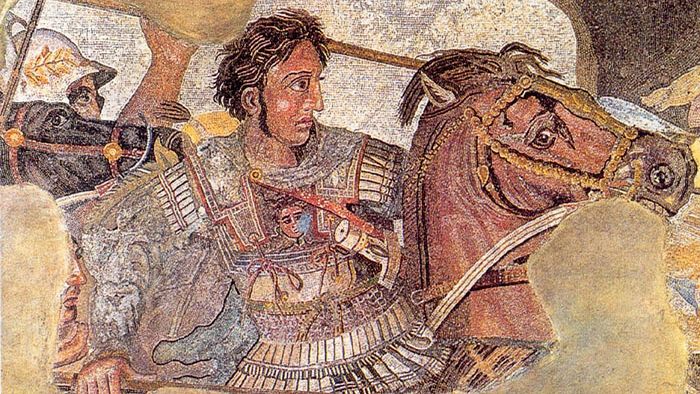How wise you were, Solomon! Your words are like an arrow fired by a skilled archer. An arrow flies at lightning speed, as if hitting the target. Likewise, words of Solomon are quick in expressing wisdom and exact in stating the meaning. So I marvel and get distressed because of my weakness as I read: He that is slow to anger is better than the mighty; and he that ruleth his spirit than he that taketh a city (Prov. 16:32). If I had a grain of such wisdom, I would have patience and be able to control my temper. Lack of patience was revealed in irritation, and annoyance—in outbursts of anger.
From childhood I used to read about wars and battles very keenly and couldn’t keep myself from scrutinizing the feat of warriors. Here is Alexander the Great, “the conqueror of the nations”, before me: he fearlessly threw himself into the very midst of battles; and, though he was wounded many times, he kept his courage to the end. Here is Cleitus the Black, his intimate friend, before me. He knew Alexander closely from his childhood, shared the hardships of military campaigns with him and led the squadron of Alexander’s chosen companions. Alexander was almost killed in the first decisive battle with the Persians. When the enemy’s hand was raised above the king’s head, Cleitus struck the foe. They moved forward together, won victories, and marched into Egypt together.
But what happened to you, Alexander? In Egypt you proclaimed yourself a “son of God”, demanded that Greek cities recognize your “divinity” and that your subjects worship you as “God”. During a feast Cleitus openly accused Alexander of arrogance because the latter attributed all his accomplishments to himself, neglecting his comrades-in-arms. Alexander the Great flew into a rage. Beside himself with fury, he threw himself at his friend with a spear, but the bodyguards restrained him and led Cleitus away. Frenzied, the king ordered the trumpeter to sound the alarm, but the latter refused, seeing that Alexander was flushed with wine and guided by passion. What a wonder: the servants behaved more sensibly than their king and the bodyguards—more wisely than their ruler. The quarrel was nearly smothered. But, as if to make matters worse, Cleitus again appeared before the king and poured out the truth to him; showing the king his right arm, he exclaimed: “This arm saved your life!” Snatching the spear from the guard’s hands, Alexander instantly made short work of his friend.
Poor, poor Alexander! Didn’t you know the words of the wise Solomon: He that ruleth his spirit is better than he that taketh a city? Panting with fury, you committed an act that at once horrified you. Seeing what you had committed, you were driven into despair and were about to pierce yourself with the same spear. But your prudent bodyguards took the spear away. Alexander spent many days weeping and grieving for the friend he had murdered himself.
 The Battle of Issos by Philoxenus of Eritrea. C. 100 B.C. A mosaic
The Battle of Issos by Philoxenus of Eritrea. C. 100 B.C. A mosaic
I sympathize with you, Alexander, and see in your deplorable acts a lesson for me to learn, because I am unable to control myself as well. Anger was revealed in me in the cruelest words to those I hold dearest, hot temper made me lose my mind, and annoyance drove me crazy.
The scorpion stings, the wolf bites, and the tiger tears apart. But the passion of anger stings, bites and tears apart at the same time. And, most importantly, it destroys the immortal souls of those who are enslaved by this passion.
Anger is the broken-off lock on the cage of the passionate soul. When hurt, this soul does not restrain the energy of passion. The energy of anger spills out just as champagne streams up from the neck of the bottle once the cork has been removed.
The longsuffering Patriarch Jacob was not afraid to say the following words about his sons Simeon and Levi, whose anger had caused the deaths of people: Cursed be their anger, for it was fierce; and their wrath, for it was cruel (Gen. 49:7). Anger drives people mad. Know that if you make a decision when you are angry, you are sure to sin. Alas, so many decisions were taken in a fit of wild anger—and every time mistakenly. Men of genius and simpletons, makers of destinies and totally unknown people have “stumbled over” this passion. Those who conquered whole nations were unable to gain control over themselves.
And I would like to offer the following observation: Any passion is dangerous for your soul, but not all of them are dangerous for those around you. Anger is fraught with danger for others. An irascible person is like a suicide bomber who wears an explosive belt to destroy himself and those around him. Exploding with rage, an easily angered person “blows up” those around him as well. Everybody around gets confused, loses inner balance, and is “knocked off their feet” by the shock.
But I open the writings of the Holy Fathers and, to my astonishment, see, read, and find out that anger is a natural power that God has put into our souls. The Cappadocian Fathers called it the irritable power of the soul. In a pure person this power is manifested purely. I was extremely surprised! It turned out that anger was originally meant to be a power that is conducive to kindness, service to God, and constructive endeavor. Anger (in its pure state) is an activity of the soul (not slackness); it is fervor—something that helps you make zealous efforts to draw closer to God and overcome all the obstacles on your way to goodness. Anger in its pure manifestation is the power of the spirit that contributes to the courageous overcoming of impediments on your ascent to salvation, to God, to theosis. This power is called on to submit to the mind.
In this sense, we can speak of righteous anger. This is precisely how the Savior treated the cunning Pharisees: He… looked round about on them with anger, being grieved for the hardness of their hearts (Mk. 3:5). It was not the vehement rejection of enemies but sorrow for the lost with the furious rejection of cunning and lies. And the whip in the hands of Christ in the Temple had no trace of passion.
Be ye angry, but sin not (Ps. 4:5), the wise Solomon’s father teaches us. The task of Christians is to help the power of anger regain its intended purpose, to transform and sanctify it. So, be angry with your sins, your viciousness and slackness. It is easier to him who has come to hate a passion to get rid of it; and he who likes passionate temptations will hardly ever give up the passion. Be angry with the devil, the enemy of God, but have pity on the people who have yielded to his temptation. Be angry with evil and all that is evil, but show sympathy for people who are susceptible to it.
That is the way it should work. The irritable power of the soul should manifest itself in this way. Woe, woe to man! What happened at the fall? How dramatically the power of anger was distorted! When a pipe bursts, the water gushes out, stops flowing in the designated direction and floods the space. In the fallen man the power of anger was reduced to sinful irritation, indignation with our neighbors, and the outrageous outbursts of emotions which are out of control for the sound mind.
Impassioned anger is like a runaway wild beast. No beast has reason. It growls and flies at weaker creatures. It hurts its prey, spills its blood and takes its life. But, paradoxically, the beast that has no reason, growls and flies at others exists in each one of us.
People give different names to this beast. Some call it “a display of quick temper”, others—a nervous breakdown, others—aggression. But its essence is the “incineration” of love and destruction of goodness.
In his mad rage Saul threw a javelin at David (but, unlike Alexander the Great, he missed the target)—this is a manifestation of sinful anger. In this sense, anger is like thunder and lightning. But if you become like Zeus the Thunderer, then you are a pagan rather than a Christian in your soul.
Abba Agathon, who accepted the false accusations of pride and intemperance with humility, only meekly refuting the accusation of heresy, stated the amazing truth: “If a man is enslaved by anger, then even if he were to raise the dead, he would not be acceptable to God by virtue of his bondage to the passion of anger.”
I get terrified as I hear this! What should I do, a sinful and fallen man? How can I learn to control myself? How can I “conquer” sinful anger inside me?
But is it really possible to overcome an explosion during an explosion? As long as the fuse is smoldering, it can be put out. But if it comes to the use of dynamite, we have no alternative other than to escape the destructive power of an explosion.
It appears that the passion of anger has its development and stages of maturity. Let us try and follow up what is happening inside us, to what step we have descended, being guided by passion towards the flames of hell.
All may begin with banal chagrin. Someone’s words or actions caused your disappointment and confusion, and you focused your attention on it. The vexation that had been accepted by your heart grew into resentment, and so, “cats began to scratch at your soul”. The “bleeding” resentment made you permanently agitated. You feel insulted and are filled with indignation: “How dare he? How is it that he is treating me this way?” You have a heavy heart, and you want to struggle for justice. And your soul gets irritated, which can be compared to boiling water: Your thoughts and feelings are “seething” and “bubbling”. “I’ll show him! I’ll give it to him!” You are seething with irritation, and in effect it is thirst for vengeance.
If it is not stopped (and the combination of circumstances ignites passion), then irritation comes to frenzy—that is, a nervous breakdown and outburst of negative thoughts, emotions, words, and acts.
Resentment is a flickering fire, irritation is a burning fuse, and anger is an explosion of dynamite.
If anger has taken root in you as a bad habit, it turns into aggression—that is, all-round malicious behavior. Aggression is an all-devouring snake which spares no one. If it has crept into the family, it is sure to ruin it. If it has crept into the work place, it is certain to damage the relations between colleagues. And if it reveals itself in a clash between two individuals, then (as we see from numerous crime reports) one of them will be dead, and the other one will become a dead man to a greater degree by killing both another human being and himself by committing this atrocity.
Accumulated anger that has not burst out from your soul turns into rancor. In its worst manifestation impassioned anger is a demonic obsession. After all, anger that develops into fury drives you out of your wits. But if you can no longer control yourself, then who has power over you? What dark and vicious spirit has gained control over your immortal soul?
I daresay that an irascible, aggressive person is worse than a possessed person. For possessed people toss about and scream, but I have never heard that any of them has killed anyone else. But someone who is obsessed with the passion of anger can easily take someone else’s life.
O wise Solomon, help me not only to marvel, but also to teach me to do what you say, have self-control, and thus become better than he who takes a city!
I open the old Lives of the Fathers and find an example to follow. One monk asked Abba Isidore the Priest of the Scetis:
“Abba, why are the demons so frightened of you?”
“Since the day I became a monk I have not allowed anger to reach my lips,” the elder replied.
It would be nice for me to learn not to let my anger spill out in words! I weep and grieve because of my own weakness!
Abba Isidore also admitted:
“One day I went to the market place to sell some baskets I had made. When I felt that anger was approaching me, I left the baskets and fled.”
I open the Ladder of Divine Ascent and see a brief instruction by St. John Climacus: “The desire for dishonor is the cure of irritation.”
That is, he who has come to like enduring dishonor will be able to overcome annoyance. Abba Isaiah the Solitary instructs me that the weapon against anger is the memory of my sinfulness. As soon as we begin to think too much of ourselves, we open the door of our souls to anger.
As I read the Holy Fathers I understand that I am weak. There is no “button”, no “knife switch” in human nature with which to ensure that an alcoholic doesn’t drink anymore, that a lecher begins to practice continence, and an easily angered person behaves quietly. My personal labor, abstinence, and abandonment of my favorite habits are required against each passion. The instructions of saints are a guideline, but I must walk the path myself.
What does my unworthy experience tell me? Irritation, chagrin, resentment and other sinful things begin with whirling thoughts, discontent that has crept into the soul, an uneasy and disquieted spirit.
A sea storm can’t start as long as there is no wind and the waves are calm. The “wind” is our thoughts that “raise the waves” of our feelings. Calm thoughts can’t cause “rough waters” and irritation of feelings in the soul. So let us pay more attention to the first disturbance of thoughts and feelings. Once we have noticed the waves of hostile thoughts and irritation, let us wholeheartedly turn to God: “Lord, save me, help me, and have mercy on me!” Christ calmed the raging elements with a wave of His hand alone—if only we were in the same boat with Him. And in order not to get upset and accumulate resentment let us learn to thank God for all things.
“But what about the injustice of those who have vexed you?” my pride tells me. “What about the trampling on your truth and the violation of your rights?” my self-love echoes. But the Lord allowed me to suffer injustice because I am unjust in the first place. Injustices came and broke my pride; the trampling on my personal truth was allowed and my self-love was crushed. I deserve to bear what has been allowed; with whom can then I be angry?
Dogs respond to barking by barking; snakes hiss; tigers growl. But man is the image of God; he reflects something divine. So let him respond to barking, hissing and growling by something that is characteristic of God.
I recall the following occurrence. Once after evening theological lessons a couple, Anatoly and Nadezhda, offered me a lift home. En route we stopped at a gas station, where several cars lined up before each fuel pump; we were in the last place at the last pump. When it was our turn, a taxi driver (a native of Central Asia) suddenly drove up from another pump, drew up on our right and demanded angrily: “I was here before you! Now it is my turn!” He was glaring at us menacingly, aggressively, as if he were ready for resolute action. We were praying silently and looking at the enraged taxi driver peacefully. And Anatoly (though he was a robust and spiritually strong man) said quietly: “Well, no problem! If you are in a hurry, please go ahead first.” And everything changed in a flash. Having heard such a peaceful answer, the Asian driver was literally transformed and his face lit up with a kind smile. His spirit of anger vanished in a tick: “Oh, I am very sorry! I was wrong. If I go first, God will punish me. I will definitely go after you!” He was smiling and looking at us peacefully if we were friends he had not seen for ages. Thus anger was overcome not only in ourselves but also in another person.
Water is opposed to fire, light is opposed to darkness, and good health is opposed to illness. It is the same in spiritual life as well: Love opposes hatred, humility opposes pride, and meekness opposes anger. While anger is an explosion, meekness is calm and stillness of the heart.
Truly, blessed are the meek, for the aggressive quickly lay down their heads, but the meek inherit the earth (cf. Mt. 5:5). Meekness is a lack of malice and anger, a quiet spirit, a humble disposition, good nature, and a peaceful heart.
But meekness is a gift from God and not an acquired habit. The grace of the Holy Spirit is attracted by prayer; it descends into a pure, peaceful, and calm soul. Once the heart has been cleansed, everything in your soul falls into place—there is neither murmuring, nor chagrin, nor the swirling of thoughts anymore. Acquire the spirit of peace, and those around you will be saved.
Righteous Joseph the Comely, whose brothers had once betrayed him and feared his revenge, said to them: Fear not: for am I in the place of God? (Gen. 50:19). He who fears God won’t plunge others into terror. But if I am not afraid of God, then let everyone around me tremble at me.
Victory over anger is hard-won. But it is extremely important. A victory over anger saves families, fixes damaged relationships between parents and children, and harmonizes all spheres of life. Believe me, it is vital to gain this victory here, on earth. Be not hasty in thy spirit to be angry: for anger resteth in the bosom of fools (Eccles. 7:9)—this is how the wise Solomon once again makes me listen to reason.
I beg for the Lord’s mercy and the prayers of our readers. I want to learn to exercise self-control so much! As for invaders of cities, may God give them peaceful hearts!





